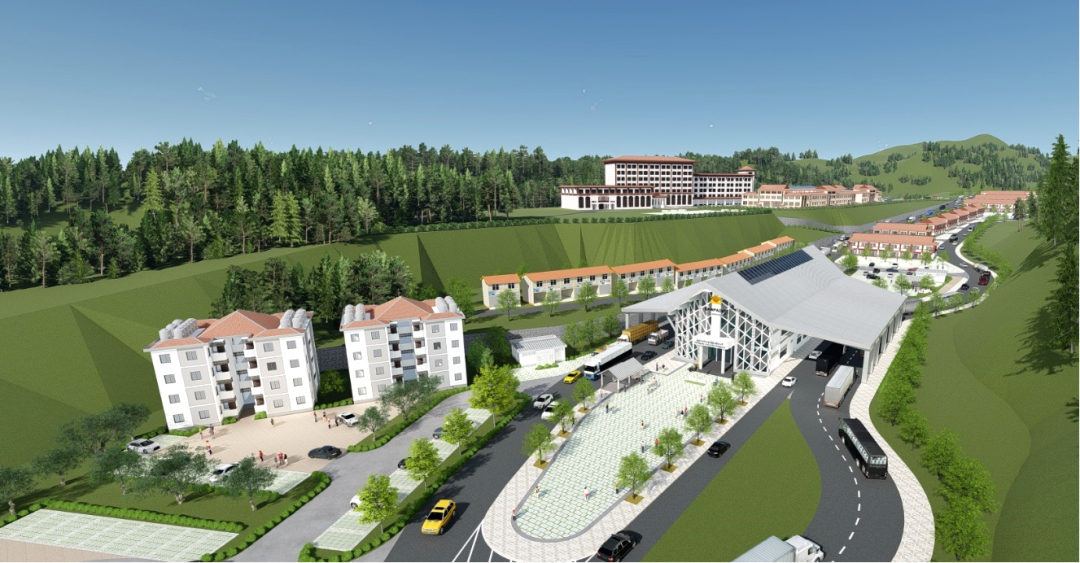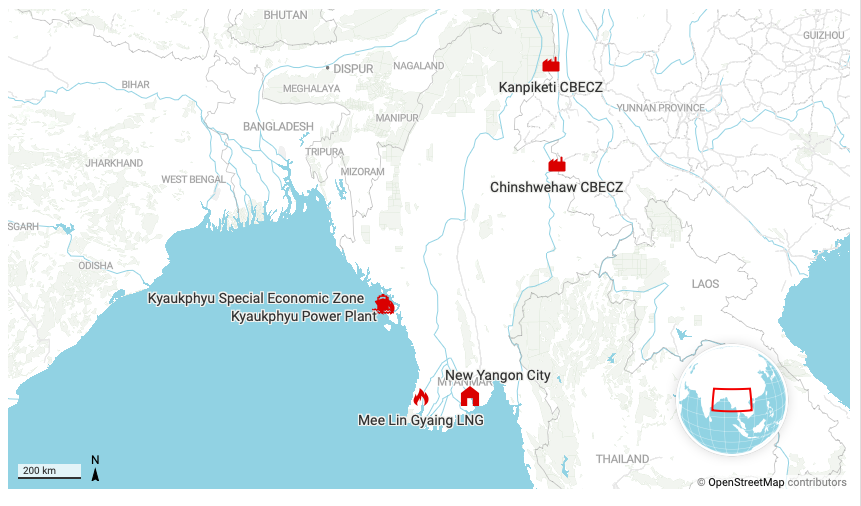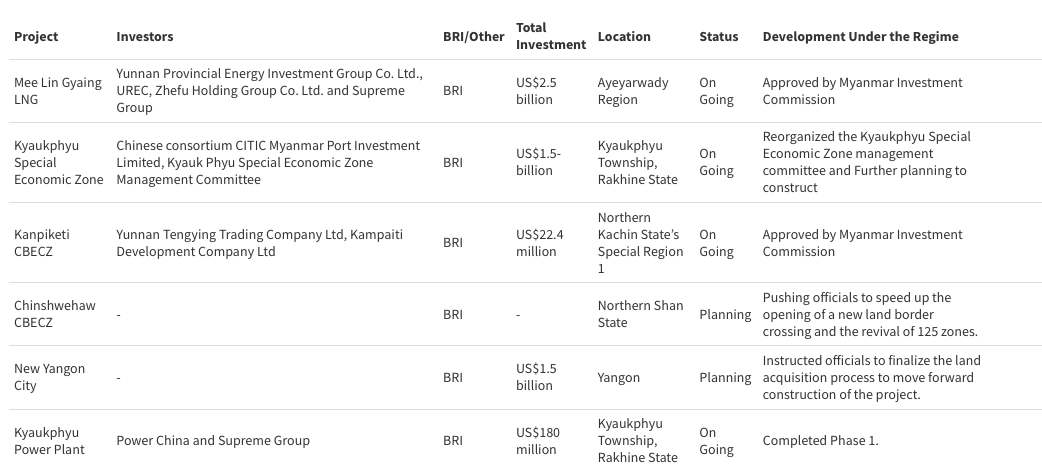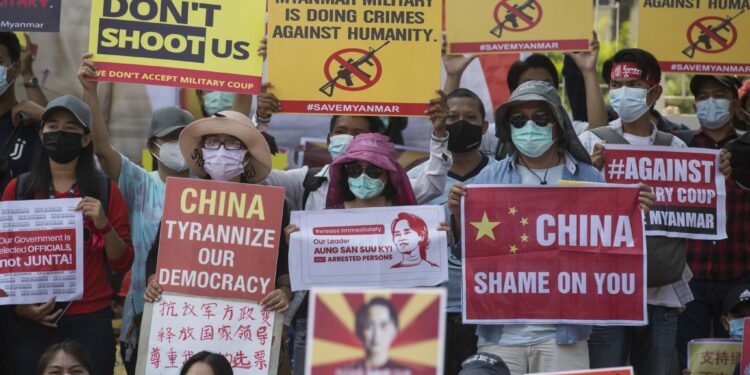Amid political upheaval, the COVID-19 crisis and ongoing fighting between the military and civilian resistance fighters and ethnic armed groups, the junta is quietly attempting to pave the way for the implementation in Myanmar of China’s strategic infrastructure projects under the Belt and Road Initiative (BRI).
Beijing has pushed repeatedly for the speeding up of the ambitious projects outlined by China’s President Xi Jinping and first proposed to the National League for Democracy (NLD) government ousted by the junta’s Feb. 1 coup.
However, none of the projects actually moved forward to the implementation stage under NLD rule, as they were still being carefully reviewed due to concerns about commercial viability and their social and environmental impact.
BRI committees and the US$2.5 Billion Power Project
Just five months after the military grabbed power, the coup leaders’ moves reveal that they have put China-backed projects at the top of their economic agenda, despite the fact that deep-seated resentment towards China is increasing across Myanmar.
One month after the coup, the military regime reorganized the leading committees charged with implementing the BRI projects. Those committees play a crucial role in engaging with Beijing, including determining key projects, signing Memorandum of Understanding (MoU) and conducting government to government negotiations.
Moreover, the junta also reorganized the implementation and working committees of the cross-border economic cooperation zones (CBECZ) in Kachin and Shan States, which are key projects under the China-Myanmar Economic Corridor (CMEC), which is itself a part of the BRI. During his trip to Myanmar last year, President Xi Jinping branded the CBECZ as a crucial pillar needed to get the CMEC off the ground.
In April, the Myanmar-China joint committee on economic, trade and technology cooperation was restructured by the junta to oversee and enhance cooperation between Beijing and Naypyitaw.
In March, the regime made another significant move, approving the US$2.5 billion BRI project Mee Lin Gyaing, a liquefied natural gas power project in Ayeyarwady region. The project is the first major foreign investment approved by the regime.

Kyaukphyu Special Economic Zone
In May, the coup leaders reorganized the Kyaukphyu Special Economic Zone (KPSEZ) management committee, which is charged with implementing a special economic zone and deep-sea port project in western Rakhine State, a key strategic component of the BRI. The project is designed to provide China with direct access to the Indian Ocean, allowing its oil imports to bypass the Strait of Malacca, as well as boosting development in China’s landlocked Yunnan Province, which borders Myanmar.
Vice-Senior General Soe Win, the vice chairman of the State Administration Council (SAC), as the regime describes itself, said during the first meeting of the Myanmar Special Economic Zone committee that the successful implementation of the KPSEZ could enhance China-Myanmar cooperation, and so help Rakhine State to develop and create jobs.
Right after the coup leaders praised the project, a Chinese state-owned firm also announced that it has completed the main components [first phase] of a power project in KPSEZ. The US$180 million plant is recognized as an important part of the CMEC and is a joint venture between Power China and Myanmar’s Supreme Group. The plant is expected to generate an estimated 1,005 million units of electricity annually for Rakhine State, including the KPSEZ.
Power China said that despite the challenges posed by the political crisis and the coronavirus pandemic, they are planning to complete the plant this year, saying that the project is crucial for the BRI in Myanmar.
In early June, the junta-appointed Minister for Commerce, Dr. Pwint San, said during a meeting with the KPSEZ management committee that the regime will provide all the necessary support to implement the KPSEZ successfully.
Cross-border Economic Cooperation Zones
As part of the efforts to push forward the CBECZ in Kachin and Shan States, branded as a crucial pillar of the CMEC by President Xi Jinping last year, the regime-controlled investment commission gave the green light in late May to begin the construction of the Kanpiketi CBECZ project in a border town in Kachin State.
The US$22.4 million Kanpiketi Business Park will cover nearly 70 acres in northern Kachin State’s Special Region 1, which is controlled by the New Democratic Army-Kachin (NDA-K) militia, which is allied with the Myanmar military. First proposed in 2018, the zone will link with the Huaqiao CBECZ controlled by the Baoshan local government across the border in Yunnan.
The business park is being presented as a model CBECZ under the CMEC and enterprises who move there will enjoy a five year tax break and other benefits.

The ousted NLD government signed an MoU to develop a business park with the Myanmar Heng Ya Investment Development Company Ltd, a joint venture between Myanmar’s Kampaiti Development Company Ltd, which is run by the sons of the NDA-K militia founder Zahkung Ting Ying, and China’s Yunnan Tengying Trading Company Ltd. However, the project’s approval was delayed due to public concerns on transparency and the controversial background of the project backers.
A few days before the project received the go-ahead from the regime investment commission, the deputy director-general of the Yunnan government foreign affairs office, Hao Kun, met with Myanmar’s Consul in Kunming, U Tun Aung Kyaw, in Kunming, the capital of Yunnan. A statement from Chinese media said that both sides discussed ways to promote bilateral relations, including the implementation of the CBECZ.
The junta has also stepped up work on a plan to construct another CBECZ in Chinshwehaw, in Shan State’s Laukkai Township, which is part of the Kokang Self-Administered Zone. That CBECZ will be linked to a Chinese CBECZ across the border in Lincang, Yunnan Province. Chinshwehaw is seen as an important trade gateway for China, as it provides the shortest route from Kunming to the Kyaukphyu Port on the Bay of Bengal.
China has proposed building a massive industrial zone in Chinshwehaw. Under a previous plan, it has proposed opening a new border crossing to serve as the main gate for the CBECZ at Chinshwehaw (Kunlong)-Lincang (Mengding), as well as reopening the 125 border zone which was destroyed in 2017 during attacks by ethnic armed group the Myanmar National Democratic Alliance Army.
In May, officials from the SAC and the Kokang Administration Department decided to re-establish the 125 border zone. An official from the Kokang Administration Department told The Irrawaddy that the Ministry of Defense and Home Affairs under the NLD government repeatedly rejected reviving the 125 border zone for security reasons.
During an implementation meeting in late June, junta-appointed Minister of Commerce Dr. Pwint San pushed officials to speed up both the opening of the new land border crossing and the revival of the 125 border zone, saying the move will boost trade with China.

New Yangon City
One of the key BRI projects in Myanmar is the controversial, US$1.5 billion New Yangon City project on the west bank of the Yangon River. The proposed 20,000 acre scheme is projected to be twice the size of Singapore.
While junta forces were launching deadly crackdowns on anti-coup protesters across the country in late March, the chairman of the SAC in Yangon, U Hla Soe, held a meeting with officials from government departments playing vital roles in the implementation of the New Yangon City project.
The meeting was attended by officials from urban housing development, land management, the development committee and the Southern District Administration of Yangon.
U Hla Soe instructed the officials to finalize the land acquisition process to move forward the construction of the project. He said that the new city project should be implemented successfully as soon as possible as it would support socio-economic development in Yangon.
An agreement to draw up a proposal for the first phase of the New Yangon City project was signed in 2018 by the New Yangon Development Company (NYDC) and the Beijing-based China Communications Construction Company, Ltd (CCCC).
However, the project has proved highly controversial because of its flood-prone location, as well as corruption and bribery allegations against CCCC involving development deals in at least ten African and Asian countries.
Subsequently, the NLD government cut the budget for the project by $800 million by reducing its size to encourage other firms to bid for the contract. It also formed a tender committee with Roland Berger and called for new proposals to compete against the CCCC proposal. Last year, it announced that nine companies, including firms based in India, Singapore, France and Taiwan, are qualified to submit rival plans to the one put forward by CCCC.
But since the coup, many have speculated that the project will go to CCCC as international investors are shunning the military regime. So far, neither the NYDC nor CCCC have announced any updates on the future of the project.
Officials close to the matter told The Irrawaddy that in order to revive Myanmar’s dire economy, the regime has decided to move forward with all international projects with the help of any investors who are willing to invest in Myanmar. However, they refused to comment further.
Key Post-Coup Projects

Myanmar Regime, Beijing and Strategic Projects
Given the junta’s assurances to Beijing about the implementation of strategic projects, the question remains whether China’s government and Chinese companies are willing to gear up investment in Myanmar while it is mired in post-coup chaos. Rising anti-Chinese sentiment in Myanmar, with many citizens accusing Beijing of supporting the coup and military rule, is another factor that might deter investment from China.
Zhao, a member of a Chinese think tank on strategic projects in Southeast Asia that is based in Yunnan, told The Irrawaddy that the Chinese government has not yet given Chinese companies specific instructions about whether to proceedด with projects in Myanmar.
“The state-owned companies have their own target and time frame when it comes to implementing the projects. Although there is political instability, Power China has completed the first phase of the power project in Kyaukphyu SEZ. It has proved that projects can be implemented where there is political stability,” said Zhao, who asked for his full name not to be used.
He added that Myanmar is a strategically important and friendly neighbor to China, saying that “when others shun [Myanmar] due to the political crisis, Chinese companies will step in. The Chinese know how to do business with Myanmar.”
“When there is a strategic interest, some projects can wait until stability returns. Chinese companies can choose to implement the projects at different times,” stressed Zhao.
When the junta called for tenders in May for 12 solar power projects in an attempt to generate much-needed foreign currency for the regime, five Chinese firms jumped in, including three state-owned companies: Power China, Union Resources & Engineering and State Grid Corporation of China.
Power China, one of the largest state-owned companies, posted the junta’s announcement on their website, showing their support for the project even as Myanmar’s parallel National Unity Government and pro-democracy supporters called for a boycott of regime-backed projects.
“Chinese companies seem to believe that the regime can control the crisis and that stability will return soon. Although Myanmar is in crisis, provincial governments in China are communicating with the regime’s officials and discussing how to make proposed projects a reality,” a Yangon-based political observer told The Irrawaddy.
News on WeChat revealed also that officials in Yunnan have made been interacting formally with regime-appointed officials to boost bilateral cooperation, despite the fact that pro-democracy supporters have called for the international community to avoid any communication with the junta to deprive the regime of legitimacy.
In early July, the Chinese Ambassador to Myanmar, Chen Hai, held a meeting with the junta-appointed Minister for Agriculture, Livestock and Irrigation, U Thin Htut Oo, to discuss issues related to promoting agriculture trade between the two countries.
The Yangon-based political observer said that since the military seized power, the Myanmar Investment Commission has stopped making the investment approval list public. But Chinese companies have continued to inform the public on WeChat about whether they have received approval from Myanmar for their projects.
“They also said that they remain committed to carrying out the projects. It means that they are happy to deal with whoever wields power in Naypyitaw,” he added.

After the regime made a series of attempts to push forward China-backed projects, Chinese Ambassador Chen Hai met coup leader Senior General Min Aung Hlaing in Naypyitaw in June, for the first time since the military takeover.
During the ASEAN-China Foreign Ministers’ Special Meeting in Chongqing last month, China’s Foreign Minister Wang Yi promised that China’s policy toward Myanmar will not be affected by changes to the country’s domestic and external situation. Beijing also promised the regime that they are ready to work with Myanmar, including the continued implementation of bilateral projects.
President Xi Jinping also promised that China will work to build a new type of international relations, including promoting high-quality development of the BRI, in an event marking the centenary of the Chinese Communist Party. Beijing signaled that it would focus on implementing the BRI projects in developing countries as a blueprint for the party’s priorities in the century to come.
In late June, Beijing invited U Wunna Maung Lwin, the regime’s foreign minister, to attend the Asia and Pacific High-level Conference on BRI Cooperation Summit. During the meeting, China gave a message to member countries that it would continue investing in BRI infrastructure projects, despite the COVID-19 pandemic.
But a group in Lashio, Shan State monitoring local China-backed projects warned that any attempt by Myanmar and China to forcibly push ahead the implementation of BRI projects would only backfire on Beijing.
U Aung Myo Hein, from the Lashio group, said that any attempt to start China-backed projects would face severe opposition from Myanmar people. He said “They [Beijing] has still not done anything yet to ease the anger of people, it is better not to add fuel to the fire”.
The Yangon-based political observer agreed with U Aung Myo Hein, saying that “given the intensity of anti-China sentiment in the country, it is better for Beijing to avoid working closely with the regime”.
“This country is facing an enormous crisis, we are descending towards being a failed state. But people have shown incredible resilience, they will fight until the end. China should not push business as usual with the junta and assume that they are capable of running the country and providing stability. That would be a complete miscalculation,” he said.
He said that the regime’s intensifying efforts to push forward BRI projects were just an attempt to please China. “They are bargaining with the projects for their own legitimacy. That’s all,” he stressed.
China’s stand at the United Nations Security Council, where it has repeatedly failed to demonstrate sympathy with pro-democracy supporters, while criticizing international sanctions on the regime, has been interpreted in Myanmar as showing support for the military regime and helping legitimize the coup leaders.
“People in Myanmar won’t stand any attempts to provide legitimacy to the regime or to start BRI projects to bankroll the generals’ pockets,” said U Aung Myo Hein.
“China should think seriously about it. Anyone who dares to try and do that will face a serious response from millions of people in Myanmar,” he added.
You may also like these stories:
Political Detainees Stage Loud Protests at Myanmar Prisons
Myanmar’s Parallel Govt Forms COVID Task Force With Ethnic Health Agencies
Leader of Junta-Allied Karen Armed Group Dies of COVID

















